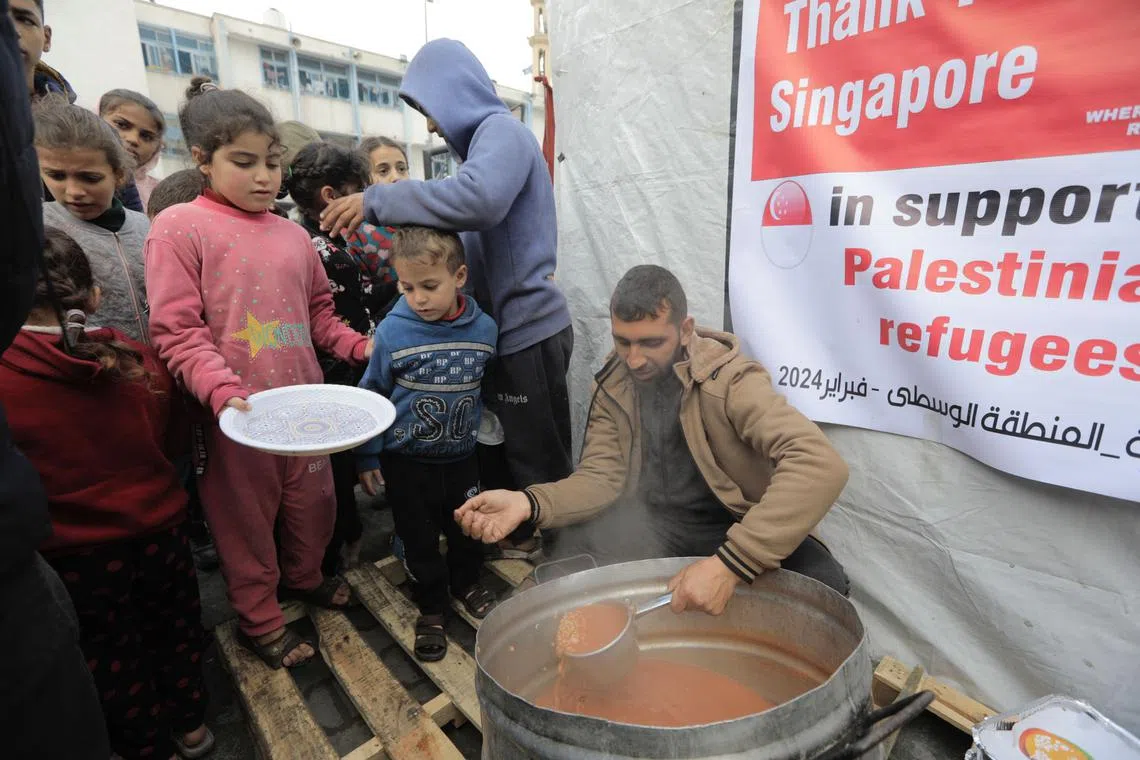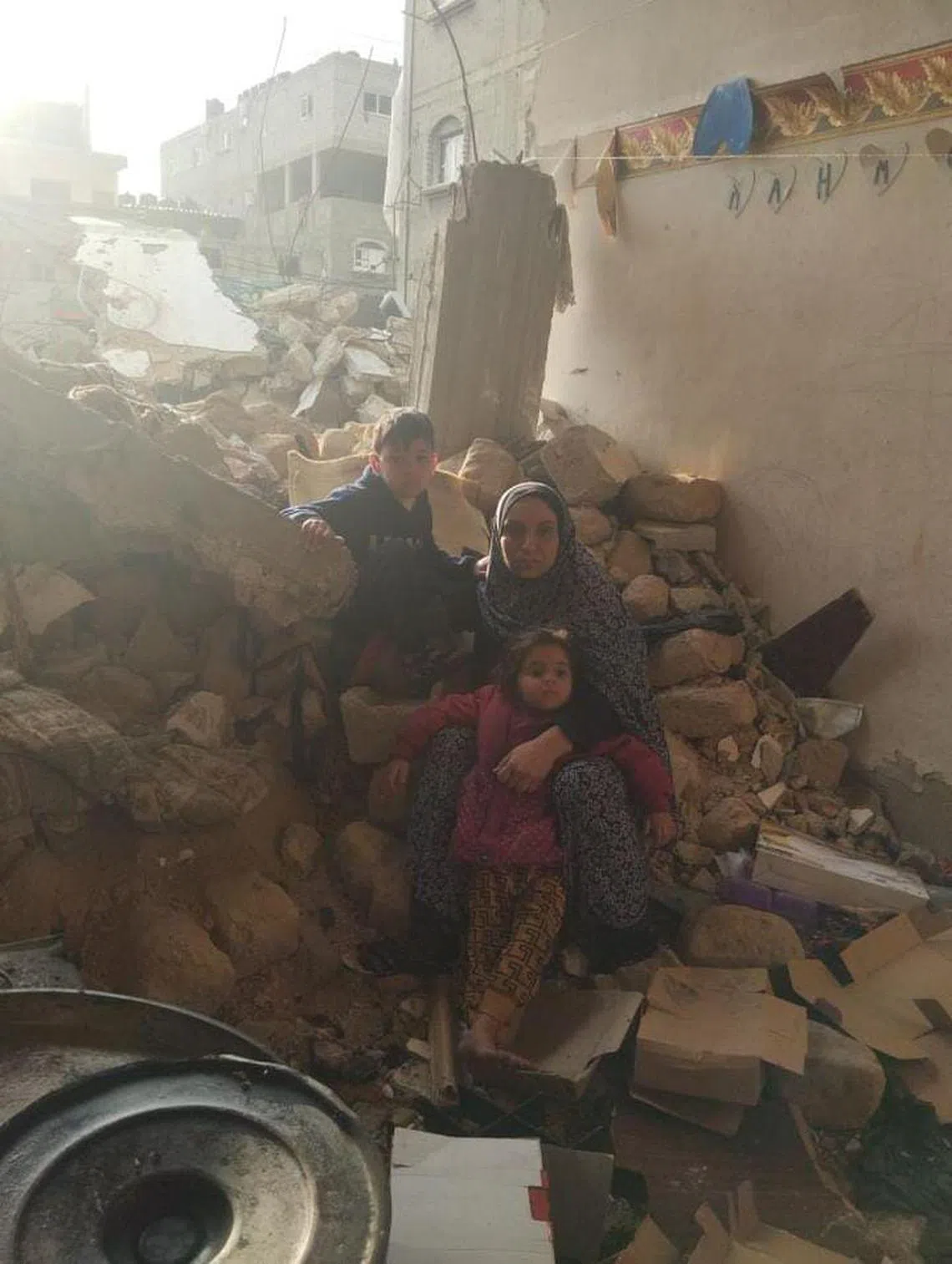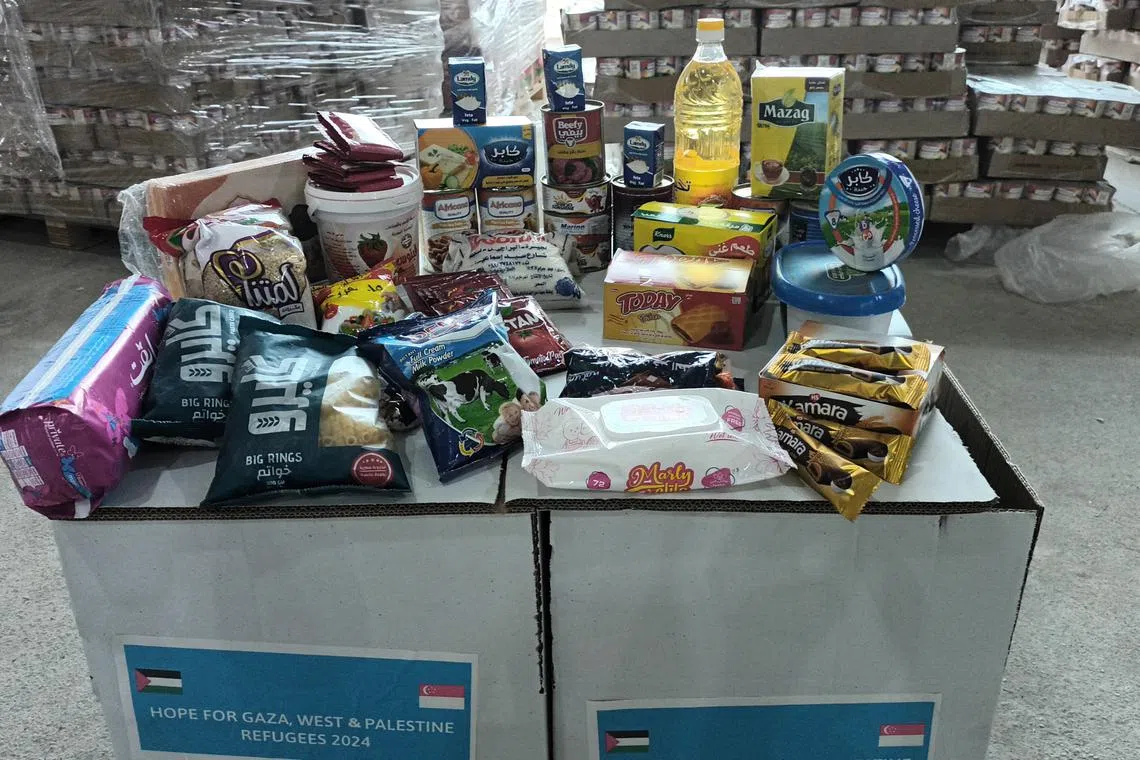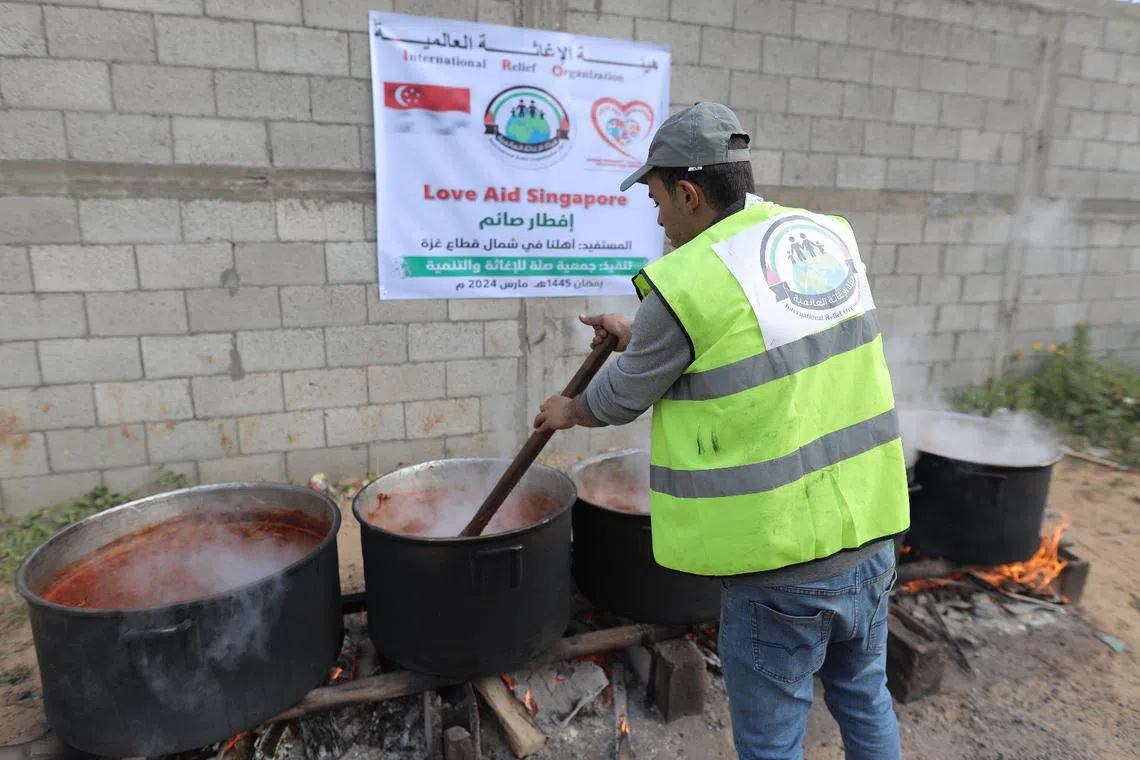In Gaza, food brings more than subsistence
Sign up now: Get ST's newsletters delivered to your inbox

Children queueing for hot soup at a kitchen in Gaza funded by humanitarian relief organisation Love Aid Singapore.
PHOTO: INTERNATIONAL RELIEF ORGANISATION
Follow topic:
SINGAPORE – Mrs Samia Jaseer Radwan has not had a hot meal in five months.
The 40-year-old Palestinian mother of two was driven from her home in Rafah when her neighbourhood was bombed on Oct 22. She now lives in a shelter in the city centre with her husband, 20-year-old daughter and five-month-old son.
They subsist on a small amount of canned beans and peas – a diet which Mrs Samia says has caused her to lose about 16kg.
“I am very sad. The taste of the goods is very bad, but there is nothing else to eat,” she tells The Straits Times via text message.
She longs for a piece of chicken or some fresh vegetables, but last she checked, chicken was sold at US$30 (S$40) a kg and vegetables at US$20 a kg.
“I don’t have enough money to buy fresh food, or milk for my little son, whom God has blessed me with after 20 years. I am very tired.”
The abundant iftar feasts of years past are a distant memory for the Palestinian family of Mrs Manar Fathi Al-Hamayda. Previously, the 41-year-old, her husband and their eight children would gather around the table and break their fast with fish or meat, salads, pies, pastries, dates, stews and soups.

Mrs Manar Fathi Al-Hamayda now lives in a partially destroyed house with her husband and eight children.
PHOTO: MANAR FATHI AL-HAMAYDA
In 2024, however, they have been left to pick at canned goods amid rubble. Their home was destroyed after part of their neighbour’s house was bombed and fell on theirs on Oct 17.
“People pulled us out of the rubble, but my children and I were injured,” she says. “We now live in one room, but do not feel safe.”
The family has not been able to recuperate properly. “For six months, we have not eaten healthy food or drunk clean water. I cannot buy anything because of the insanely high prices.”
She hopes to raise enough money to move her family out of Gaza and into Egypt, where relief workers like Mr Muhammad Ashik Mohamed Daud, 37, the executive director of Singapore disaster relief agency Mercy Relief, have been distributing aid to refugees.
Mercy Relief was able to feed some 6,000 people during its most recent distribution of food and other supplies in mid-March. Among the items given out were cooking oil, milk powder, pasta, biscuits and dates.
Dates, in particular, were picked for their religious significance.
“During Ramadan, dates are part of the fasting ritual – many Muslims consume them when breaking their fast,” says Mr Ashik. “We felt it was important to help create a sense of normality for the refugees.”
These food packs were delivered to those living in Gaza, reaching them around sundown, when most Muslims break their fast.

Singapore disaster relief agency Mercy Relief has delivered two tranches of aid to Gaza so far, and hopes to distribute another round of support in the coming months.
PHOTO: MERCY RELIEF
The team of three from Singapore also worked with about 20 locals to organise an iftar meal of kebabs with rice and hummus for some 200 refugees in Cairo on March 16.
It was an experience Mr Ashik describes as especially memorable: “As people tucked into their food, we saw more and more smiles appearing. They became more energetic, and colour returned to their faces.”
It soon became a social event, with lively chatter about ordinary topics.
He says: “For many of them, it was their first time praying with Singaporeans, and they had many questions about our country.”
Mr Ashik adds that the refugees conveyed a deep sense of gratitude. For them, the meal was not just something to be consumed, but also a clear symbol that they are not alone. Mercy Relief has also raised funds to feed victims of the 2022 Pakistan floods, as well as Typhoon Vamco in the Philippines in 2020.
It is this sense of solidarity that fuels aid workers like Mr Gilbert Goh, 62.
Love Aid Singapore, a humanitarian relief organisation he founded, is funding four kitchens in refugee camps around Gaza. The former social worker says it costs about US$50,000 a month to run one kitchen serving hot meals with meat, and about US$30,000 a month to sustain a vegetarian kitchen.

Service has resumed at the Jabalia refugee camp kitchen, which was hit by an airstrike on March 2 that killed nine workers. It is funded by humanitarian relief organisation Love Aid Singapore and run by the International Relief Organisation.
PHOTO: INTERNATIONAL RELIEF ORGANISATION
Each kitchen is run by the Germany-based International Relief Organisation and feeds 1,500 to 2,000 people a day.
“It is a labour of love,” Mr Goh tells ST over a phone call. “When you cook a warm meal and distribute it to the Palestinians, they know someone is helping them – even from as far away as Singapore. They know that they have not been forgotten.”
But hot food is a luxury that requires energetic volunteers and fresh ingredients – both of which are in short supply. And with the UN warning of imminent famine, even canned goods have become a precious commodity. Access to Gaza by land is severely limited, and several countries – Singapore included – have taken to airdropping aid into the ravaged territory instead.
“We were told to collect canned food because the supplies were going to be airdropped into Gaza, so we needed something durable,” says Mr Jonathan How, 52, chief executive officer of Relief Singapore. The social enterprise, which focuses on humanitarian assistance and disaster relief, contributed some eight tonnes of canned food to the Republic’s aid airdrop in late March.
Mr How says that during Relief Singapore’s public donation drive in mid-March, it tried to source items that beneficiaries would be familiar with. In a Facebook post, it asked donors to contribute only halal, ready-to-eat canned goods with a shelf life of at least six months, and which could be opened by pulling a ring. The suggested items included hummus, fish, corned beef and vegetables like aubergines.
“Collecting culturally suitable items is important because it shows respect, sensitivity and consideration towards the people of Gaza, especially in this extremely difficult time. So we worked with a Muslim volunteer who reached out to her Palestinian contacts to come up with a list of suggested donations.”
In the end, Relief Singapore collected more than expected, such that only a third could make it on board the Republic of Singapore Air Force’s airdrop mission. The remaining 14 tonnes of food will be distributed later in 2024.
Donations are still rolling in for Love Aid Singapore too. With consistent support from Singaporeans, Mr Goh hopes his team will be able to set up more kitchens in Gaza to restore hope to its people, one meal at a time.


